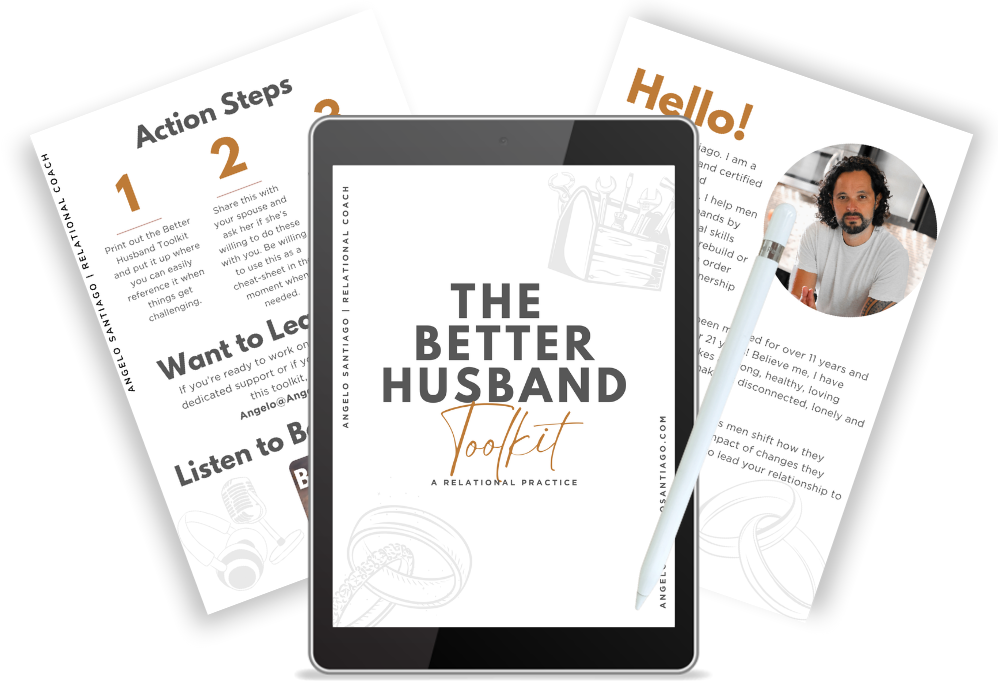Building a Better Marriage: Why Ownership Changes Everything
Nov 06, 2025
Have you ever tried to apologize to your wife and something like, “I’m sorry I did that, but you did this too” came out instead?
It’s subtle, and maybe you don’t even realize you’re doing it, but everything after the word “but” takes away from what you just said. It minimizes and cancels it out.
It’s like saying, “You’re a great guy, but…” or “I love how you handled that, but…” The moment that word appears, your ownership disappears. And when that happens, your apology doesn’t open your partner up to conversation and connection. It puts them right back on guard. It’s like reaching out with one hand while pointing a finger with the other.
If you want to change your marriage and become a better husband, this is where it starts: owning your part fully, no matter what she’s doing.
The Power of a Clean, Honest Apology
The other day, I came home after being away for a few hours, genuinely excited to see my wife. I walked in wanting to spend some quality time together, but she was on a work call.
I tried to say hi, but she was busy, so she just smiled and waved. I didn’t really get the connection I wanted. By the time she got off the call, I was already in the kitchen, making myself lunch. I was hungry, distracted, and not present.
She came over to connect with me, but I didn’t meet her. The moment passed. We went our separate ways, each busy with what we needed to do.
Later, I realized we felt distant, and I had a choice.
I could say, “Hey, I’m sorry I wasn’t present earlier, but when I walked in, you didn’t connect with me either.”
Technically, that would be true. But emotionally, it would be disconnected. Rather than ownership, that’s just blame disguised as accountability.
Instead, I tried, “Hey, I’m sorry I didn’t connect with you when you came over. I was hungry and distracted, and I see how I missed you in that moment.”
No “but.”
No expectation for her to own her part.
Just me standing in mine.
The Importance of Relational Integrity in Your Marriage

In the past, I wouldn’t have even noticed that moment. I would’ve focused on what she didn’t do, convinced myself I was right, and stayed distant.
But something that Relational Life Therapy (RLT) teaches us is this: every time we withhold affection or presence as a reaction, we’re not leading. We’re just reacting. And reacting never brings you closer.
In RLT, we talk about taking 100% responsibility for your 50% of the relationship. That means you don’t wait for her to go first, you don’t base your apology on her behavior, and you don’t need to be the good guy or the bad guy. You just need to be the grounded, relational guy.
This is what’s called relational integrity.
Relational integrity means keeping your side of the relationship clean, no matter what your partner does. You take responsibility for your behavior, tone, and choices. And that goes for not just when things are calm, but especially when they’re not.
Don’t wait for her to apologize first, and don’t match her mood. Her bad day is not an excuse for yours.
If you show up well, then it’s a good day for the relationship—period.
Now, no one is saying this is easy. This kind of ownership takes maturity. It takes emotional clarity. And most of all, it takes intention. Most men were raised to defend, to justify, to prove they weren’t the one to blame.
But marriage isn’t about winning an argument. It’s about building a relationship that feels safe, steady, and connected for both people.
How Conditional Apologies Trap You
Here’s where a lot of husbands get stuck.
They think they’re taking ownership, but then they slip in a “but.”
“I’m sorry I yelled, but you kept interrupting me.”
“I know I overreacted, but you started it.”
It might feel honest or fair, but it’s defensive and doesn’t help to open up the situation to an eventual solution. Plus, it pushes your wife further away.
When you add a “but,” you cancel out everything before it. Rather than take responsibility, you shift it.
Here are a few other versions of this that show up in marriages all the time:
- “I’m sorry I forgot to call, but you didn’t remind me.”
- “I know I snapped, but you were already annoyed.”
- “I shut down last night, but you always come at me sideways.”
Each one cancels the apology. Each one keeps the wall up.
It’s important to note that taking ownership doesn’t mean taking all the blame. It doesn’t mean letting yourself get walked over. It means you see your impact, you own it, and you clean it up.
That’s what a better husband does.
You can still hold boundaries while taking ownership. You can say, “I was wrong for how I spoke to you,” and still believe your feelings were valid.
Clean ownership allows for both your and her experiences to exist, and that’s what builds trust. Not because you gave in, but because you chose connection over control.
A 3-Step Ownership Practice That Builds Trust
Here’s a simple practice you can start using right now.
The Ownership Check-In:
- What did I do?
Be specific. No excuses, no minimizing. - How might she have felt when I did that?
Take a guess. That’s empathy. - What will I do differently next time?
You don’t need the perfect answer here. It's more so about progress.
You can even write these down in your notes app or journal at the end of the day:
“What did I do today that helped us connect?”
“What did I do that created distance?”
“What can I try differently tomorrow?”
When you practice ownership like this, your wife doesn’t feel like she has to defend herself. She feels seen, and you get to feel proud of how you’re showing up.
The Benefits of Ownership For You

When you take full ownership, it’s not just your marriage that reaps the benefits… you do too.
You stop second-guessing yourself, holding resentment, and carrying shame. You begin to feel proud of the man you’re becoming.
In RLT, we say that every break in connection needs a repair, and ownership is the start of that repair. Someone has to go first, not because they’re at fault, but because they care enough to lead.
So ask yourself:
- Where am I half-owning something in my marriage right now?
- Where am I sneaking in a “but”?
- What would happen if I just fully owned my part?
You don’t have to solve every issue today. Start small. One moment, one tone of voice, one missed opportunity for connection. Own it.
You don’t need her reaction to validate it. The goal is always integrity over control.
Practicing Full Ownership in Marriage
This week, take full ownership of one moment without needing your wife to do the same.
No “but.” No conditions. No expectations.
Say something like:
“Hey, I realized I was short with you earlier. That’s on me. I want to do better next time.”
Then stop talking.
Maybe she softens, maybe she doesn’t. Either way, let it be. Remember that we’re going for integrity here, not control. Your job is to lead the repair.
That’s what a better husband does: he leads with relational integrity and lets that be enough.
True Leadership Begins with Ownership
When you add a “but,” you weaken your words. When you own your part fully, you build trust.
A good husband takes responsibility. A better husband takes it without blame, defense, or needing anything in return.
So take the lead, and be the first to repair. Not to earn points, but because that’s who you want to be.
That’s how you change your marriage from the inside out.
–
Ready to Go Deeper?
If this message hit home for you, this is the exact kind of work we do in the Better Husband Workshop—a guide to help men stop reacting and start leading with integrity in their marriages.
And if you’d rather listen to this message, check out the full podcast episode on Better Husband wherever you listen.
Need Help In Your Marriage?
Subscribe to the Better Husband Newsletter to get weekly updates with marriage support, new blog posts, podcast updates and more!
By signing up you consent to receive regular emails from Angelo Santiago with updates and the occasional promotion for services. You can unsubscribe at any time. View our detailed privacy policy in the footer.





